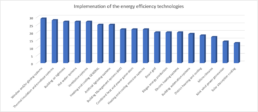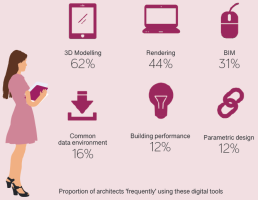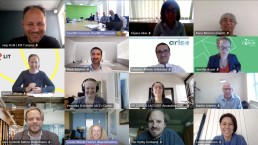Reaching a Sustainable Built Environment: Our Analysis
We just published the Report: “European roadmap: BIM applied to energy performance”.
The report provides inputs to develop a roadmap to achieve the correct development of a workforce ready to face the challenges of climate changes. The report starts recalling the requirements already defined in the European directives dealing with energy performance, the use of renewable energy sources, and digitalisation. Then, starting from the outputs of the previous deliverables, the roadmap summarises the knowledge, the skills and the competences needed both on the demand side and the offer side to obtain more resilient buildings to climate change with a decreased use of natural resources.
The roadmaps intend to ensure that current and future stakeholders interested in increasing the competences in the energy and digital domains, guarantee that existing and future training materials are adequate and continuously adapt to change. The roadmaps start from an in-depth analysis of the status quo in the participating countries.
The roadmaps should allow any company, public administration, and individual to fill the gap of competences and take advantages of all innovative energy and digital technologies.
In all the partner countries there is legislation supporting both the use of renewable energy sources and the improvement of the energy performance. Digitalisation is not always compulsory, but there are many initiatives to increase the competences in this domain starting from the public tenders where the use of BIM is becoming required in many countries. Consequently, we expect a huge future increase in the demand of digital competences needed in all the supply chain.
To provide the basis for the development of national roadmaps we considered a matrix where we suggest the level of knowledge/competence of the different targets for each technology. Digitalisation should be considered an instrument and not a final goal and should be applied by any blue and white collar of the building supply chain during its whole life cycle.
The goals of the directive are the same in every country. However, some countries are a few steps ahead in its implementation. To ensure the achievement of the same level by all, it is essential to promote the implementation of new technologies on both the demand and the offer side.
Based on a survey circulated among the project partners, we can make some interesting assumptions.
There is a strong correlation between the quality of the national VET (Vocational, Educational and Training) and LLL (Life-Long-Learning) systems and the use of technologies related to energy performance in buildings. North European countries developed more reliable training systems, and as a consequence they also make a better use of RES and technologies for energy efficiency. There is a persistent need, in all countries, to facilitate the use of more innovative technologies, which are still rarely taught in formal training.
In the following two diagrams we can observe the level of implementation of the different technologies considering the average of the different countries.
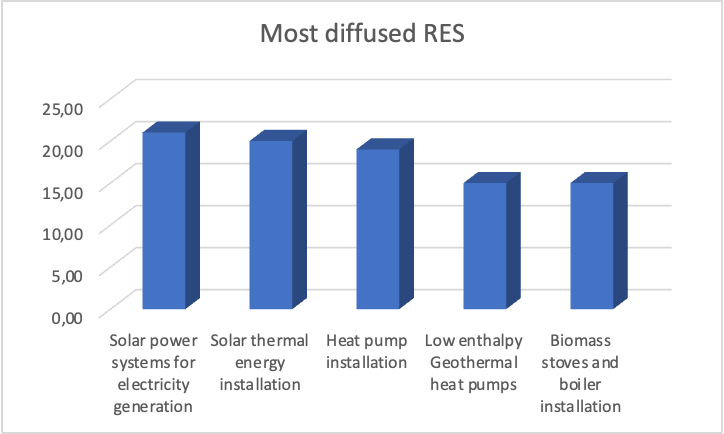

The ARISE platform can provide the support needed to achieve a higher maturity level in any sector and for any target as it is based on micro-competences. Thanks to the platform, the new technologies can be introduced directly by their producers. They can use it as a mean to provide training materials to be able to design, install and maintain new equipment and/or materials that can improve the energy performance of buildings.
The implementation of digitalisation shows that the problem is more related to the lack of a full maturity on the demand side. Designers are usually ready to implement digitalisation as it facilitates their work, but if the demand of public administration and both public and private owners does not increase, it cannot be fully implemented in the supply chain. The consequence is that the owners cannot profit from the benefit of managing all the information linked to their assets in order to decrease the cost of management and maintenance.
In the following diagram we can observe the different levels of maturity as average of the situation in each of the partners’ countries.

If the constructors do not implement the model received by the designers with the information of the products and equipment used and installed, the owner gets only marginal benefit from the BIM model produced by the designer. Therefore, there is a strong need to increase the comprehension of the benefits introduced by the full implementation of BIM in the supply chain. This analysis is also useful for training program developers and providers, providing them with directions on how to profile their programs.
In this case too, the ARISE platform can be beneficial as the European chapters of buildingSMART international are working for an agreement aimed at increasing awareness of the benefits of BIM along all the supply chain using the training materials developed for the individual qualifications available for free to everyone.
For more information, download the Report here.
Digitalisation: what is changing for architects?
An interview with Veronika Schröpfer, Head of EU Research Projects at the Architects’ Council of Europe
>> Digitalisation is changing the work of architects around the globe. At the moment there are around 560.000 architect in Europe, most of these working alone or in small offices. SMEs have the advantage to be quicker to adapt to new technologies and tools. Architects have shown themselves to be extremely willing to learn, more than half of those using each tool are self-taught. Architects are much more likely to use new tools out of personal or business interest than due to client or regulatory requirements. This shows that architects are enthusiastic to adopt digitalisation tools.
The role of the development of digital competences in the building domain
>> Architects contribute around 17 billion Euros to the EU economy (ACE, sector study 2020). Nevertheless, ACE has advocated for more diversity in software and tool providers. Annual licence fees for software can be a barrier for micro sized architecture practices. They cannot afford various licences for similar tools but different providers depending on the project. Hence the interoperability of tools and platforms are vital.
>> You can see in our 2020 ACE sector study, that there has been a proliferation of new digital tools which the architectural profession is adopting. A majority of architects use 3D modelling tools ‘frequently’, and nearly half use rendering tools frequently. About one in three architects frequently use BIM on their projects. An important aspect is that most architects use the tools out of their own choice.
The impact of putting in place a recognition system valid at European level
>> Our 2020 ACE Sector Study has revealed that the vast majority of architects taught themselves how to use digital tools.
No more than 35 per cent received formal training for any of the tools, although more received informal training. On average architects spend about 20 hours of official Continuing Professional Development (CPD) per year. CPD is a structured way of maintaining and developing the competence as a qualified professional by engaging in regular learning activities. For a training recognised and valid at EU level it should be endorsed by ACE Member Organisations in various EU Member States and meet the minimum agreed European quality standards. Various European training bodies should recognise each other’s CPD, making it easier for architects to work in the countries they choose. Usually, one learning hour equals one international CPD credit. Therefore, we joined the ARISE project, as it will work on the recognition of the CPD competences through the development of a platform based on microunits certified with blockchain.
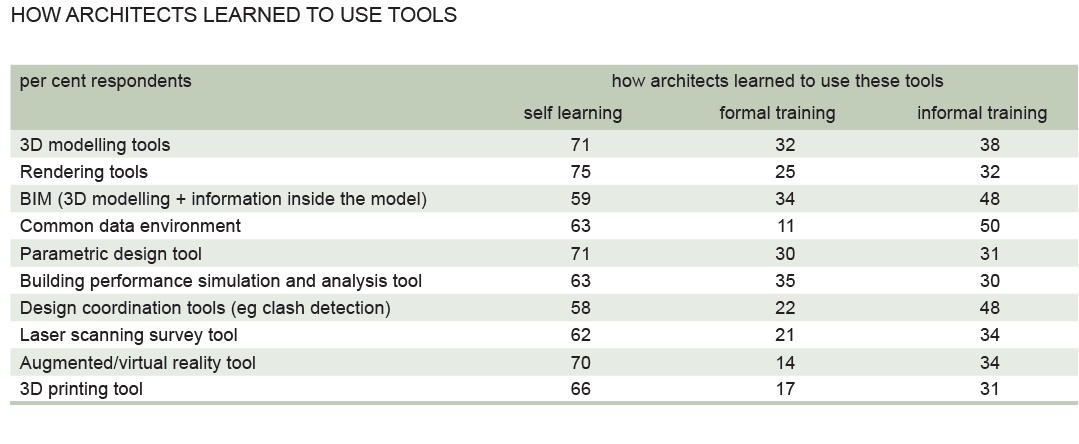
Dr. Veronika Schröpfer, Head of EU Research Projects at the Architects’ Council of Europe
Images and sources of numbers from the ACE Sector Study: https://www.ace-cae.eu/fileadmin/user_upload/2020ACESECTORSTUDY.pdf
EUSEW 2021: Energy Talks 25 - 29 Octobre 2021
The EU Sustainable Energy Week (EUSEW) took place on 25-29 October 2021 under the theme: ‘Towards 2030: Reshaping the European Energy System’.
This year, as last year EUSEW went digital. The event comprised a 3-day digital Policy Conference, the EUSEW Awards, the second European Youth Energy Day as well as 1:1 video meetings, virtual stands and other networking activities. Participants had access to online side events and Sustainable Energy Days, digital events that took place all over Europe.
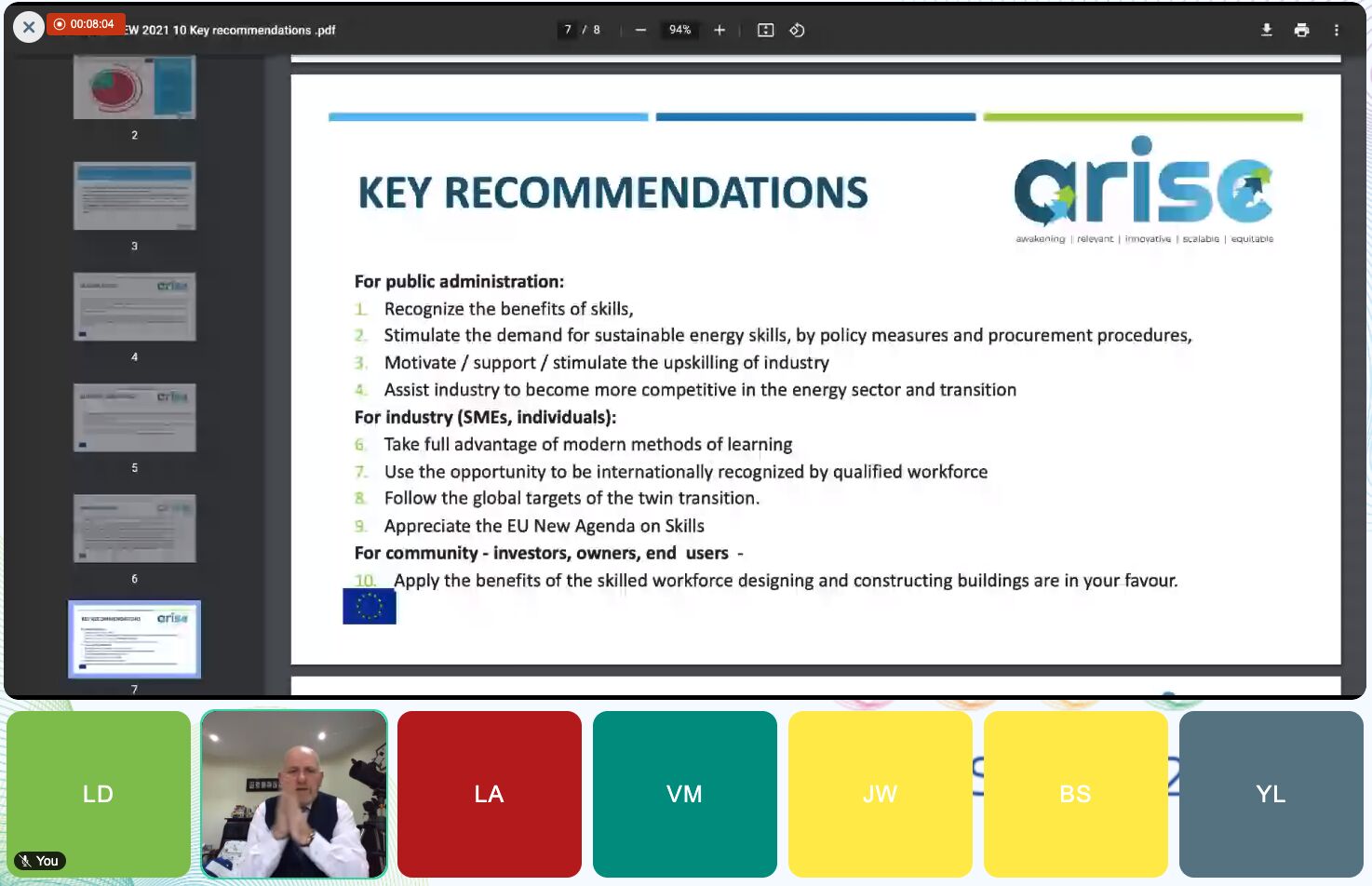
ARISE project coordinator Paul McCormack presented in the section #energytalk '10 key policy recommendations on #digitalising the #construction sector for a clean #energy #transition'. He explained why the construction industry must empower their staff to enable them to design a digital transformation roadmap for the sector.
Digital Transformations - building services engineering article
Find the full article on the building services engineering website.
If industry is to develop and leverage its digital skills for energy efficient construction, and increase its competitiveness, it will be driven via the skills of the workforce. Upskilling must be demand-driven, demand both from the industry perspective and from the workers in the industry. It is this “meeting of demands” that will lead to success in meeting the needs of industry, society and the environment.
Digital transformation is a topical subject for all of industry and is seen as a key organisational strategy to support sustainable growth, especially in industries such as construction which is seen as a technology laggard. BIM is recognised as one of the main digital tools that are critical enablers that can embed digital processes within organisations. Specifically, the information management processes within BIM help companies in transforming traditional information processes and turning the information into data that is easier handled, used and analysed.
ARISE Launch
Belfast Metropolitan College launched their new £1.12 million European digital construction project, ‘ARISE’ in the 2 days KICK OFF meeting 1st and 2nd September 2021.
ARISE aims to revolutionise the learning process by changing the face of delivery and recognition of sustainable energy skills in the building sector.
ARISE’s mission is to support the twin transition of the design and construction sector and to contribute thereby to the European Recovery and Resilience Plans 2021 -2027, by providing the building sector professionals with digital and sustainable energy skills of the future, along with demand-side guidelines for marketable appreciation of skills and exploitation of benefits thereof.
The nine partners in the project consortium are:
- Belfast Metropolitan College, Northern Ireland
- Technological University Dublin, Ireland
- Institute for Research in Environment, Civil Engineering and Energy, North Macedonia
- ISSO, Netherlands
- Architects’ Council of Europe, Belgium
- IBIMI Institute for BIM, Italy
- Building Changes, BV, Netherlands
- Copenhagen School of Design and Technology, Denmark
- Instituto Superior Technico, Portugal.
On the opening launch day on Wednesday, September 1, Belfast Met Innovation Manager and ARISE Programme Manager, Paul McCormack gave an introduction and outlined the challenges and objectives for the 30-month programme.
Louise Warde Hunter, Principal and Chief Executive of Belfast Met also addressed the opening day audience with: “Today’s ARISE launch reinforces Belfast Met’s commitment to engage in international partnerships and applied Research & Development, working in innovative ways with industry to meet the emerging skills needs of the economy at home and abroad. “
“Our People, our Planet, and our Partnerships are key to addressing the interconnected challenges of sustainability at TU Dublin. The ARISE project creates a positive impact by addressing real-world challenges in the construction sector through the upskilling of individuals to reach their infinite potential. ARISE leverages learning post-Covid, by offering bite-size educational units through a digital mobile curriculum to enable learning opportunities that are accessible and sustainable in our daily lives.” Stated Ms Jennifer Boyer, Vice President of Sustainability, Technological University Dublin, one of the nine European partners on the project, which has Belfast Met as the lead partner.
The funding for the project was gained through the EU Horizon 2020 Work Programme. Ms Amadine De Coster-Lacourt, Project Advisor, (CINEA), European Climate, Infrastructure and Environment Executive Agency, highlighted that: “ARISE will contribute to the Green Deal and the Renovation Wave objectives by facilitating recognition of sustainable energy skills in the built environment and increasing demand for those skills”.
The distinct work packages work to be carried out by the partners were discussed and detailed Work Packages.
- WP1 MANAGE Belfast Met
- WP2 BENCHMARK energy & digitalisation skills IBIMI - Italy
- WP3 DESIGN framework ISSO The Netherlands
- WP4 DEVELOP autonomy e-engine KEA - Denmark
- WP5 FILL agility e-tools TU Dublin
- WP6 PILOT Digital Pathway energise Belfast Met
- WP7 REPLICATE market implementation IECE Macedonia
- WP8 COMMUNICATE dissemination & exploitation ACE Belgium
Martin Lennon, Director, (OHMG), O Hare McGovern stated: “The early involvement of OHMG with (previous project) BIMcert was the platform that escalated our BIM journey, ensuring we remained at the forefront of digital innovation.
“ We are delighted to once again join with BMET and their international partners, at the start of their ARISE project journey. The result of this partnership will ensure OHMG have a skilled workforce who will have the knowledge, experience and competencies to deliver on the Government’s Construction 2025: Strategy”.
Mark Baldwin, Building Smart International, in Switzerland added: “Competency assurance is a significant aspect contributing to the success and sustainability of the digitalization of the built asset industry.”
ARISE will revolutionise the learning process by monetizing skills development and learning exchange with a digital system based on skills recognition rather than accreditation. The training and transaction system developed by the project will reward learners as they achieve competence at a certain level with the cryptocurrency for skills exchange - CERTcoin – the innovative currency of skills and learning of the design and construction sector embracing today’s digital transformation benefits. This reward-based on skills and time credits will be stored in an Individual Learning Account and can be used as digital points accumulation for example in a skills barometer or for exchanging it into valid certificates. It will be an easier accessible, less time consuming and still competitive way to up-skill design and construction professionals and workers, as well as market demand side – public administration, clients and owners.
ARISE will apply digitalisation both as a learning method and as a framework of job-based construction skills of the future, multiplying the effects of the green transition skills. The novel training method will make the learning process attractive and effective, facilitating its accessibility through a mobile (smartphone) and a user-friendly web-based platform. The intervention/learning progress will be achieved in a scalable way, in bite-sized skills delivery. ARISE will apply digitalisation and the earning of learning credits in a "step by step" recognition of competencies, as an accelerator to empower demand for sustainable energy skills in the desing and construction sector, and as an enabler of formal certification. This system will be employed based on blockchain procedures to instil transparency and trust.
Within 30 months, until February 2024, partners will work on the development and demonstration of the innovative on-demand training scheme for digitalisation towards sustainable energy skills, aimed at both supply and demand sides.
Revolutionising the learning process by changing the face of delivery and recognition of sustainable energy skills in the construction sector
That’s the target for the ARISE project team as they seek to deliver their new EU wide skills and training project, boosting thereby market uptake of qualified workforce.
ARISE has secured a €1.12M grant from the Horizon 2020 Work Program: Building a Low-Carbon, Climate Resilient Future: Secure, Clean and Efficient Energy, under the Call: Increasing Market Demand for Sustainable Energy Skills in the Building Sector.
ARISE’s mission is to support the twin transition of the construction sector and to contribute thereby to the European Recovery and Resilience Plans 2021-2027, by providing the construction sector workforce with digital and sustainable energy skills of the future, along with demand-side guidelines for marketable appreciation of skills and exploitation of benefits thereof.
Through a highly innovative approach, ARISE will deploy a system coupling methodology and approach, and encompassing:
1) Skills delivery method;
2) Learning accounts transaction and recognition;
3) Matrix of skills maturity, leading to new qualifications and jobs;
4) Profession–based learning content;
5) Impacts of skills on buildings’ energy performance;
6) New market and regulatory models of skills demand; and
7) Stimulation of investments in high energy performance buildings.
Engaged in the project demonstration stage, over 1000 stakeholders across Europe will improve their skills and competences, providing therefore project induced impact of over 4.5 million kWh/year of energy savings, 2.25 million kWh/ year of RES energy generation, reduction of GHG emissions by over 3.5 tons/year and initiation of 1.3 million EUR/year of investments in NZEBs. As a long–term cumulative impact, ARISE aims to contribute by over 75 million kWh of clean energy use in buildings and over 8,7 million EUR of green investments.
ARISE will revolutionise the learning process by monetising skills development and learning exchange with a digital system based on skills recognition rather than accreditation. The training and transaction system developed by the project will reward learners as they achieve competence at a certain level with the crypto currency for skills exchange: CERTcoin, the innovative currency of skills and learning of the construction sector embracing today’s digital transformation benefits. The learners’ CERTcoins, based on skills and time credits will be stored in an Individual Learning Account and can be used as digital points accumulation for example in a skills barometer or for exchanging it into valid certificates. It will be an easier accessible, less time consuming and still competitive way to upskill blue and white collars, as well as market-demand side, public administration, clients and owners
ARISE will apply digitalisation both as a learning method and as a framework of job-based construction skills of the future, multiplying the effects of the green transition skills. The novel training method will make the learning process attractive and effective, facilitating its accessibility through a mobile (smartphone) and a user–friendly, web-based platform. The intervention / learning progress will be achieved in a scalable way, in bite-sized skills delivery. ARISE will apply digitalisation and the earning of learning credits in a "step by step" recognition of competences, as an accelerator to empower demand for sustainable energy skills in the construction sector, and as an enabler of formal certification. This system will be employed based on blockchain procedures to instil transparency and trust.
ARISE utilises a circular economy approach specifically utilising digital skills stimulation and delivery across the entire building life cycle and assets to decarbonise the complete energy cycle. This approach harnesses the market drivers from the demand side and matches these with impact targeted strategies and objectives required to achieve comprehensive success. ARISE represents a multi faceted approach to tackle the carbon footprint of the construction sector. It is a pioneering training scheme AND a powerful socio - economic cross sectional influencer, affecting the multiple sectors of education, industry, market, and policy by delivering a dynamic training and market uptake model
The project led by Belfast Metropolitan College with eight other European partners will be launched in September 2021. Within 28 months, until December 2023, partners will work on development and demonstration of the innovative on demand training scheme for digitalisation towards sustainable energy skills, aimed at both supply and demand side.
The nine partners in the project consortium are:
- Belfast Metropolitan College, Northern Ireland
- Technological University Dublin, Ireland
- Institute for Research in Environment, Civil Engineering and Energy, North Macedonia
- ISSO, The Netherlands
- Conseil des Architectes D Europe Brussels
- IBIMI Institute for BIM- Italy
- Building Changes, B.V. The Netherlands
- Copenhagen School of Design and Technology Denmark
- Instituto Superior Technico, Portugal
